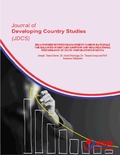RELATIONSHIP BETWEEN MANAGEMENT FASHION RATIONALE FOR BALANCED SCORECARD ADOPTION AND ORGANIZATIONAL PERFORMANCE OF STATE CORPORATIONS IN KENYA

View/
Date
2018Author
Osewe, Joseph Ouma
Gachunga, Hazel
Senaji, Thomas
Otieno, Romanus Odhiambo
Metadata
Show full item recordAbstract
Purpose: The purpose of this study was to determine the relationship between management fashion rationale for balanced scorecard adoption and organizational performance of state corporations in Kenya. Methodology: The research design employed in this study was explanatory cross-sectional survey research design. The population was 32 state corporations that have adopted balanced scorecard. A sample size of 96 top and senior middle level managers comprising of Managing
Directors, Human Resource Directors, Finance Directors, Operations Directors, or their equivalent designations in senior management were surveyed using semi-structured questionnaires. The research adopted a quantitative approach.
Findings: The findings indicated that management fashion rationale of balanced scorecard adoption is a good predictor of organizational performance of State Corporations in Kenya. The findings also showed that management fashion rationale and organizational performance had a positive and significant relationship. Unique Contribution to Theory, Practice and Policy: In line with the findings, it is recommended that organizations should not adopt balanced scorecard model from a fad and fashion perspective. They should adopt the balanced scorecard with a long-term benefit of it in their mindset
URI
file:///C:/Users/User/Downloads/581-229-2351-3-10-20180212.pdfhttp://repository.must.ac.ke/handle/123456789/1248
